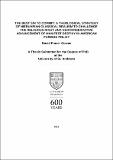Files in this item
The best sin to commit : a theological strategy of Niebuhrian classical realism to challenge the Religious Right and neoconservative advancement of manifest destiny in American foreign policy
Item metadata
| dc.contributor.advisor | Holmes, Stephen R. | |
| dc.contributor.advisor | Lang, Anthony F. | |
| dc.contributor.author | Cowan, David Fraser | |
| dc.date.accessioned | 2013-11-14T14:28:24Z | |
| dc.date.available | 2013-11-14T14:28:24Z | |
| dc.date.issued | 2013-11-30 | |
| dc.identifier | uk.bl.ethos.581853 | |
| dc.identifier.uri | https://hdl.handle.net/10023/4202 | |
| dc.description.abstract | While few would deny America is the most powerful nation on earth, there is considerable debate, and controversy, over how America uses its foreign policy power. This is even truer since the “unipolar moment,” when America gained sole superpower status with the end of the Soviet Union and the Cold War. In the Cold War Reinhold Niebuhr was the main theological voice speaking to American power. In the Unipolar world, the Religious right emerged as the main theological voice, but instead of seeking to curb American power the Religious right embraced Neoconservatism in what I will call “Totemic Conservatism” to support use of America’s power in the world and to triumph Manifest destiny in American foreign policy, which is the notion that America is a chosen nation, and this legitimizes its use of power and underpins its moral claims. I critique the Niebuhrian and Religious right legacies, and offer a classical realist strategy for theology to speak to America power and foreign policy, which avoids the neoconservative and religious conservative error of totemism, while avoiding the jettisoning of Niebuhr’s theology by political liberals, and, the political ghettoizing of theology by his chief critics. This strategy is based on embracing the understanding of classical realism, but not taking the next step, which both Niebuhr and neoconservativism ultimately do, of moving from a prescriptive to a predictive strategy for American foreign policy. In this thesis, I argue that in the wake of the unipolar moment the embrace of the Religious right of Neoconservatism to triumph Manifest destiny in American foreign policy is a problematic commingling of faith and politics, and what is needed instead is a strategy of speaking to power rooted in classical realism but one which refines Niebuhrian realism to avoid the risk of progressing a Constantinian theology. | en_US |
| dc.language.iso | en | en_US |
| dc.publisher | University of St Andrews | |
| dc.rights | Creative Commons Attribution-NonCommercial-NoDerivs 3.0 Unported | |
| dc.rights.uri | http://creativecommons.org/licenses/by-nc-nd/3.0/ | |
| dc.subject | Foreign policy | en_US |
| dc.subject | Classical realism | en_US |
| dc.subject | Reinhold Niebuhr | en_US |
| dc.subject | America | en_US |
| dc.subject | Manifest destiny | en_US |
| dc.subject | Religion | en_US |
| dc.subject | Politics | en_US |
| dc.subject | Niebuhrian | en_US |
| dc.subject | Religious Right | en_US |
| dc.subject | Constantinianism | en_US |
| dc.subject | Power | en_US |
| dc.subject | Neoconservatism | en_US |
| dc.subject | Stanley Hauerwas | en_US |
| dc.subject | American exceptionalism | en_US |
| dc.subject | American foreign policy | en_US |
| dc.subject | Wilsonianism | en_US |
| dc.subject | Totemic conservatism | en_US |
| dc.subject | Realism | en_US |
| dc.subject | Conservatism | en_US |
| dc.subject | Fundamentalism | en_US |
| dc.subject | Liberalism | en_US |
| dc.subject | Silent majority | en_US |
| dc.subject | George W Bush | en_US |
| dc.subject | Henry Kissinger | en_US |
| dc.subject | Richard Nixon | en_US |
| dc.subject | Jimmy Carter | en_US |
| dc.subject | Bill Clinton | en_US |
| dc.subject | Ronald Reagan | en_US |
| dc.subject | Gerald Ford | en_US |
| dc.subject | George H.W. Bush | en_US |
| dc.subject | Abraham Lincoln | en_US |
| dc.subject | The Great Awakening | en_US |
| dc.subject | Antebellum American | en_US |
| dc.subject | Soft power | en_US |
| dc.subject | Hard power | en_US |
| dc.subject | Religious dialogue | en_US |
| dc.subject.lcc | BL65.I55C7 | |
| dc.subject.lcsh | Religion and international relations--United States | en_US |
| dc.subject.lcsh | Niebuhr, Reinhold, 1892-1971 | en_US |
| dc.subject.lcsh | Religious right | en_US |
| dc.subject.lcsh | Conservatism | en_US |
| dc.subject.lcsh | Political messianism--United States | en_US |
| dc.title | The best sin to commit : a theological strategy of Niebuhrian classical realism to challenge the Religious Right and neoconservative advancement of manifest destiny in American foreign policy | en_US |
| dc.type | Thesis | en_US |
| dc.type.qualificationlevel | Doctoral | en_US |
| dc.type.qualificationname | PhD Doctor of Philosophy | en_US |
| dc.publisher.institution | The University of St Andrews | en_US |
| dc.publisher.department | School of Divinity; School of International Relations | en_US |
This item appears in the following Collection(s)
Except where otherwise noted within the work, this item's licence for re-use is described as Creative Commons Attribution-NonCommercial-NoDerivs 3.0 Unported
Items in the St Andrews Research Repository are protected by copyright, with all rights reserved, unless otherwise indicated.


